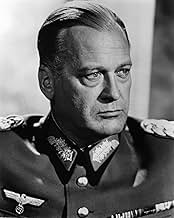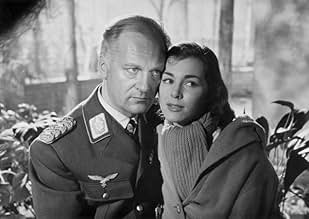PUNTUACIÓN EN IMDb
7,3/10
1,4 mil
TU PUNTUACIÓN
Añade un argumento en tu idiomaDuring WW2, German general Harry Harras is a test pilot and chief engineer for the Luftwaffe but his contempt for the Nazis and sabotage at the aircraft plant land him in hot water with the ... Leer todoDuring WW2, German general Harry Harras is a test pilot and chief engineer for the Luftwaffe but his contempt for the Nazis and sabotage at the aircraft plant land him in hot water with the Gestapo.During WW2, German general Harry Harras is a test pilot and chief engineer for the Luftwaffe but his contempt for the Nazis and sabotage at the aircraft plant land him in hot water with the Gestapo.
- Dirección
- Guión
- Reparto principal
- Premios
- 2 premios y 3 nominaciones en total
Eva Ingeborg Scholz
- Waltraut 'Pützchen' Mohrungen
- (as Eva-Ingeborg Scholz)
Karl Ludwig Diehl
- Generaldirektor Hugo Mohrungen
- (as Carl Ludwig Diehl)
Joseph Offenbach
- Kriminalrat Zernick
- (as Josef Offenbach)
Wolfrid Lier
- Kellner Detlev
- (as Wolfried Lier)
Reseñas destacadas
German audiences in the 1930's thrilled to see the astonishing aerial acrobatics of Ernst Udet in the mountain films of Arnold Fanck. The highest-ranking air ace to survive WWI, he was to become Colonel-General of the Luftwaffe but the unbearable pressures of the job, his sense of being betrayed by Goering and his despair at Hitler's invasion of Russia led to his taking his own life.
It is generally accepted that the character of General Harras in Carl Zuckmayer's hugely successful post war play is loosely based on Udets and is a fictionalised account of his final days.
The title role in this excellent film adaptation made an international star of the charismatic Curd Juergens and deservedly won him a Best Actor award at Cannes. It is undeniably his finest role and arguably his best performance.
The cast is uniformly excellent and the characters well drawn, not least Eva-Ingerborg-Scholz as the loathsome Putzchen and Viktor de Kowa as rabid Nazi Schmidt-Lausen. The career of de Kowa, despite his being on Goebbel's 'Important Artists exempt list' and his membership of the Nazi party, continued unabated after the war and his marvellously menacing portrayal is riveting. Marianne Koch plays Harras' young love and their mutual attraction is convincing despite the age gap.
This piece cannot but betray its theatrical roots but under Helmut Kautner's customarily expert direction and with Klaus Dudenhofer's editing it never drags and builds to a stupendous climax.
The intelligent and artistic Helmut Kautner not only navigated the shark infested waters of the Third Reich but also gave us one of its greatest films, 'Romanze in Moll' and managed to rise above the crass commercialism of 1950's German cinema.
It is generally accepted that the character of General Harras in Carl Zuckmayer's hugely successful post war play is loosely based on Udets and is a fictionalised account of his final days.
The title role in this excellent film adaptation made an international star of the charismatic Curd Juergens and deservedly won him a Best Actor award at Cannes. It is undeniably his finest role and arguably his best performance.
The cast is uniformly excellent and the characters well drawn, not least Eva-Ingerborg-Scholz as the loathsome Putzchen and Viktor de Kowa as rabid Nazi Schmidt-Lausen. The career of de Kowa, despite his being on Goebbel's 'Important Artists exempt list' and his membership of the Nazi party, continued unabated after the war and his marvellously menacing portrayal is riveting. Marianne Koch plays Harras' young love and their mutual attraction is convincing despite the age gap.
This piece cannot but betray its theatrical roots but under Helmut Kautner's customarily expert direction and with Klaus Dudenhofer's editing it never drags and builds to a stupendous climax.
The intelligent and artistic Helmut Kautner not only navigated the shark infested waters of the Third Reich but also gave us one of its greatest films, 'Romanze in Moll' and managed to rise above the crass commercialism of 1950's German cinema.
Curd Juergens, Germany´s famous actor of the fifties and sixties, here playing a part that made him a star: The Devil´s General is an airforce general with extraordinary success in building new warplanes for the luftwaffe in ww2. At the same time, he is definitely not a nazi, not a bureaucrat but a party animal and a human being with a certain sense that everybody should be treated as human beings. This makes him an enemy to the high ranks of the SS and at the same a potential partner for people of the german resistance. In the end, he pays the bill for being part of a system, he never really said "no" to. A great movie with one great actor.
"The devil's general" is about a war hero from the First World War who is still in the army when the Second World War breaks out, but who is secretly opposed to the Nazi's. Of course this general has to operate very carefully in order not to get unmasked. The film portrays the actions of this general, sometimes not without humour.
Helmut Käutner was one of the few post war German directors who remained in Germany during the Nazi regime but managed not to compromise himself by participating in Nazi propaganda. In fact his only respected colleague was Wolfgang Staudte. For years these two directors were the only two making quality cinema in Germany.
Helmut Käunter is mainly known for "Unter den Brucken" (1946), in the style of "L'Atalante" (1934, Jean Vigo).
The opening scene of "The devil's general" reminded me vaguely of "The damned" (1969, Luchino Visconti). There is a party of high ranked Nazi's. On the surface evrything is cheerful, but below there is a lot of mistrust and complot thinking.
After the opening scene the film remains well done but it does not equal the quality of "The damned". For this "The devil's general" lacks the perversity and cynicism that makes "The damned"such a great movie.
Helmut Käutner was one of the few post war German directors who remained in Germany during the Nazi regime but managed not to compromise himself by participating in Nazi propaganda. In fact his only respected colleague was Wolfgang Staudte. For years these two directors were the only two making quality cinema in Germany.
Helmut Käunter is mainly known for "Unter den Brucken" (1946), in the style of "L'Atalante" (1934, Jean Vigo).
The opening scene of "The devil's general" reminded me vaguely of "The damned" (1969, Luchino Visconti). There is a party of high ranked Nazi's. On the surface evrything is cheerful, but below there is a lot of mistrust and complot thinking.
After the opening scene the film remains well done but it does not equal the quality of "The damned". For this "The devil's general" lacks the perversity and cynicism that makes "The damned"such a great movie.
10hoffmanu
The epic of Goethe's "Faust" replayed in real life (Ernst Udet, Generalluftzeugmeister, was the source for Zuckmayer's General Harras), and in a play by Carl Zuckmayer. Displays excellently how Germans were suckered into following the modern day "Pied Piper from Austria": Adolf Hitler; and how you have to pay the piper if you follow him. "Denn wer auf Erden des Teufels General gewesen ist und ihm die Bahn gebombt hat, der muss ihm auch in der Hoelle Quartier machen!" - "For whoever was the Devil's General on this Earth, and who bombed the path for him, also has to be his quartermaster in hell!"
10clanciai
This has been called the best German film ever made, and that might very well be the case. The play is Carl Zuckmayer's, but the film is a masterpiece in itself and offers a different aspect on this major dilemma of conscience among leading officers in Nazi Germany at the crucial time of the German invasion of Russia and the American involvement in the war - Germany was the one who declared war on the US. Above all the direction (by Helmut Käutner) brings the film on a universal level in its intensity and deep empathy with many besides the general, especially some of the women, and this drama could and should engage anyone, since it highlights the eternal problem of a human standing in relation with politics, political necessity and political pressure. One man in this film spites the system and does what he does because he feels ashamed of being a German because of what Germany is doing to the world, and that brings the drama to critical extremes with inevitable consequences, and generel Harras is perfectly logic in his ensuing action.
In spite of lack of action and dramatic effects, the film is invaluable for its sustained human drama involving many relationships and persons with highly engaging and pregnant dialogue all the way, presented by brilliant acting, so this is a film never to forget and always keep at hand for immediate access and reference.
In spite of lack of action and dramatic effects, the film is invaluable for its sustained human drama involving many relationships and persons with highly engaging and pregnant dialogue all the way, presented by brilliant acting, so this is a film never to forget and always keep at hand for immediate access and reference.
¿Sabías que...?
- CuriosidadesThe main character, Gen. Harras, is based on World War I hero Ernst Udet.
- ConexionesReferences Die Deutsche Wochenschau (1940)
Selecciones populares
Inicia sesión para calificar y añadir a tu lista para recibir recomendaciones personalizadas
- How long is The Devil's General?Con tecnología de Alexa
Detalles
- Duración
- 1h 57min(117 min)
- Color
- Mezcla de sonido
- Relación de aspecto
- 1.33 : 1
Contribuir a esta página
Sugerir un cambio o añadir el contenido que falta

































